The fuse box is vital in controlling the electrical circuits in your home, but much like any other installation, it is susceptible to damage, particularly with age. If you have noticed problems with your fuse box, whether this may be circuits tripping or lights flickering, then it may be time to begin considering a replacement before any issues have the chance to grow. Unless you are a qualified professional, knowing when a new fuse box is due is not always clear, so we have put together this guide on fuse box replacement, including warning signs to look out for, along with when to contact our electricians.
How to determine when you need a fuse box replacement
Typically, the only time that you will need to go near your fuse box is when you need to switch off your mains electricity, which means that if you haven’t experienced an issue yet, you may have never taken a look at the internal components. However, knowing what each element means will help you to spot when a replacement is necessary, preventing potential dangers. We recognise that this can be daunting, so to help you to understand when you need a new fuse box, we will run through the following:
- What is a fuse box?
- What can go wrong with a fuse box?
- Does my fuse box need replacing?
- Fuse box replacement FAQs
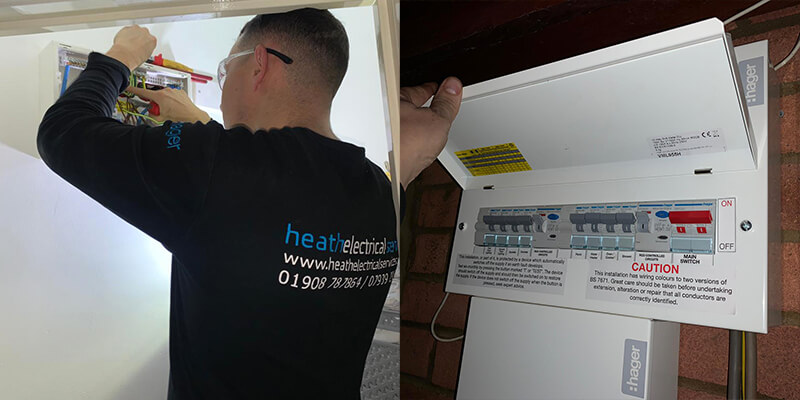
What is a fuse box?
Before taking a closer look at the problems that may lead to a fuse box requiring replacement, it is important to understand what you are dealing with. By spending time familiarising yourself with the various components of a fuse box, it will become far easier to spot issues before they have the chance to grow.
A fuse box, otherwise known as a consumer unit, is designed to control the electrical flow to your property. If you are unsure where to find your fuse box, your first job should always be to track down its location and ensure easy access to it. Clear any clutter that may be obstructing your pathway so that in the event of an emergency, you can reach the fuse box quickly. In some cases, the fuse box may be installed higher up on a wall, so in this instance, it would be beneficial to keep a stepladder nearby.
Once you know where your fuse box is, it is time to open it up and take a look at the inner components. Unless you are an electrician, the tonnes of switches and, in older installations, wiring is likely to be daunting; however, you will be pleased to know that there are only a few key components that you will need to know. These are as follows:
- Main Switch – This is used to shut off the entire electrical supply to your home and is vital to know in an emergency. Knowing how to switch your power on and off will allow you to protect yourself and your family against shock or injury should a problem arise.
- Residual Current Devices (RCD) – Although a more modern introduction to fuse boxes, Residual Current Devices (RCDs) have saved many lives. They are designed to automatically switch off your electricity when they detect a problem with an electrical appliance or sense that someone has touched a live wire. It is for this reason that you are recommended to test the RCDs at least every three months. You can find more information on how to do this on Electrical Safety First.
- Circuit Breakers – Similar to RCDs, circuit breakers are also integrated for safety purposes to switch off a circuit when danger is detected, causing a ‘trip’. If your circuit breakers ever do ‘trip’, then once you have corrected the fault, all you will need to do is reset the switch.
For more information on the key components of a fuse box, as well as details on the different types of consumer units, take a look at our previous article.

What can go wrong with a fuse box?
Having spent many years as reputable electricians in Milton Keynes, we would always say, if you are unsure about what is wrong with your fuse box, get in touch with the professionals. Our team is always more than happy to visit your home to check your fuse box condition, which is far safer than attempting to delve into a situation that you may not feel comfortable with.
Nevertheless, much like any other aspect of your home, in some cases, problems with your fuse box may be inevitable and easy to identify since they simply come with age. If you are familiarised with what these problems may be and what they are an indication of, you will be able to determine your next steps to rectify the situation. With this in mind, the most common things that can go wrong with a fuse box are as follows:
Fuses become loose or fall out
Regardless of the type of fuse box you have or its age, one thing that is for sure is that the fuses should always fit snugly in their terminals. If you notice that any fuses have become loose or they always seem to fall out, then you should seek the recommendations of an electrician. It is likely to be an indication that the terminals are either defected or have rusted, meaning that they can no longer serve their purpose.
The fuses trip for no apparent reason
Although circuit breakers are designed to cause electricals to ‘trip’ when they detect danger, this should not be happening time and time again. Should you find yourself resetting your fuse box frequently, then this may be down to poor wiring or a short circuit contained in the box. Our team of contractors can arrange electrical inspections in Milton Keynes, which will determine the exact root of the problem, allowing you to take the next steps to resolve the issue. Home Tree has put together a handy guide with more information on why your fuse box may keep tripping.
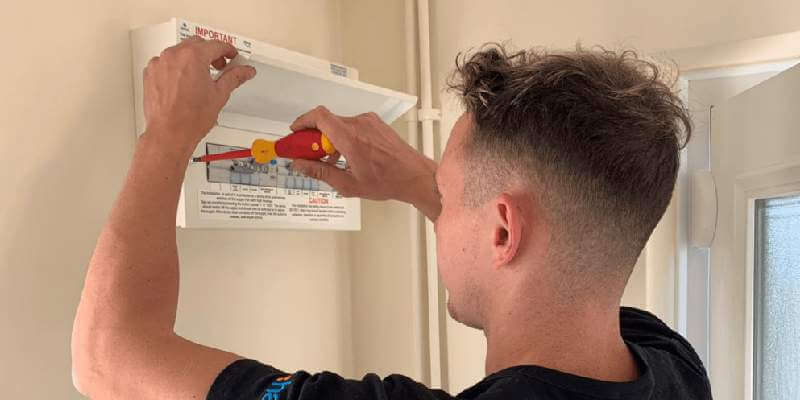
Fuses melt and terminals burn
No component of your fuse box should ever show visible damage, so if you notice melted fuses and burnt terminals, then it is almost certain that they have overheated. This is a huge indication that there is a dangerous defect with your fuse box, meaning that a certified electrician should be contacted. Leaving the problem to grow will put your home at risk of an electrical fire. For more information and statistics on house fires in the UK, take a look at the Morgan Clark blog.
The fuse box smells and makes strange sounds
If you are not confident with the components of your fuse box or electrical installations, then it can be tricky to determine the above problems. However, one that is always easy to spot is a strange smell or sound coming from the fuse box. Hissing or popping sounds, as well as a strong odour, are sure warning signs that there is an issue brewing inside. These problems cannot resolve themselves and will grow, so again, it is vital to book a visit from our electrical contractors in Milton Keynes.
The circuits become overloaded
As technology continues to evolve, every property is now filled with an array of different electrical devices, each of which requires a steady stream of electricity. However, especially if you use extension leads, this can become too much for your fuse box, forcing it to overwork and eventually overload. An overloaded fuse box can prove to be very dangerous, making regular inspections of how many devices you are running off each circuit essential. Rubber Box Co Ltd has put together a useful guide, including top tips on avoiding an electrical overload.
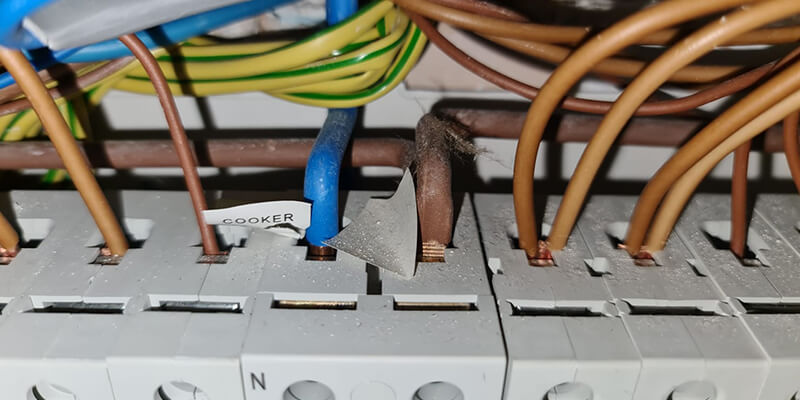
Does my fuse box need replacing?
Unless you are a professionally trained electrician, knowing when you should get a new fuse box can be tricky as there are not always clear warning signs. If you experience any of the problems mentioned above, then, as always, it is recommended to get in touch with your local electrician, who will advise you as to whether a repair or replacement will be necessary. However, there are several other reasons why you may need to get a new fuse box; these include:
- Added protection against electrical fires – As mentioned above, a common problem with fuse boxes is overheating, which, although typically down to too many electrical devices, can also be down to an old design. Older fuse boxes can sometimes experience poor cable connections, which is another cause of overheating and, therefore, electrical fires. In more recent years, plastic consumer unit cabinets have been replaced with steel alternatives, limiting the spread of an electrical fire.
- Your current fuse box is getting old – If your lights keep flickering or your sockets do not seem to be working as well as they should, then this is a sure sign that your fuse box is beginning to deteriorate. This often starts when the fuse box is over ten years old.
- Added protection against electrical shocks – Earlier in our article, we mentioned the importance of RCDs; however, if you have checked your fuse box and cannot find this component, then a replacement is recommended. Older fuse boxes were not designed with RCDs, which are vital in preventing electrical shocks, so an upgrade will be due.
- Your current fuse box has an asbestos flash guard – We are all more than aware of the dangers of asbestos, which means that if the mineral is used anywhere across your home, you should be looking to get it removed. Although not used anymore, in the past, asbestos was used for flash guards, meaning that you will be put at risk of fibres releasing.
- Your current fuse box is full – In some cases, your reasoning behind a fuse box replacement may be as simple as your current consumer unit is full, yet you require additional circuits. This is common for those who are renovating their home and want to switch to an electric oven or shower, for example.
If you do decide that you want to replace your fuse box, then it is vital that this is only completed by a qualified electrician. This is because, with every installation, you must be provided with a certificate which confirms your compliance with building regulations. Our team will always let you know how long the replacement will take so that you can plan accordingly and that disruption is kept at a minimum. To speak with a qualified electrician and schedule your fuse box replacement, please feel free to get in touch with our team.
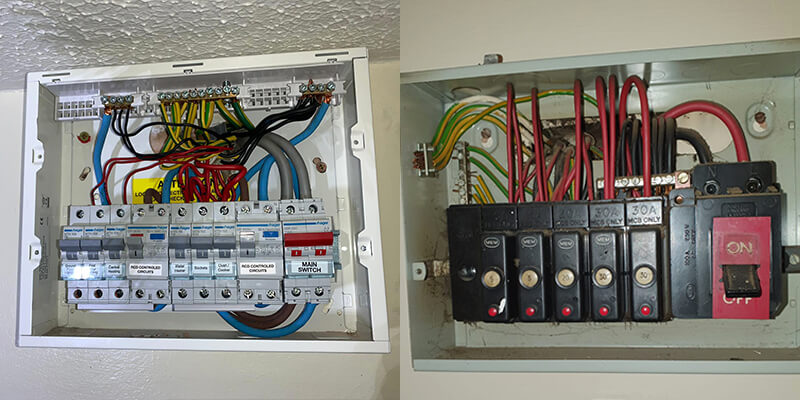
Fuse box replacement FAQs
Some common questions that we get surrounding fuse box replacement – as well as their answers – are listed below:
Where is my fuse box?
Typically, the fuse box will be located either in your utility room, porch, under stairs, in cupboards or in the garage.
Why is my fuse box tripping?
If your fuse box is constantly tripping, there is an issue with it that needs to be looked into. This could be caused by a range of things, from electrical faults to an overloaded circuit.
Do fuse boxes need to be replaced?
Eventually, all fuse boxes will require replacement, whether they develop faults prematurely or deteriorate with age.
How long does it take to replace a fuse box?
The job typically takes around half a day, depending on the size of your property and whether your current wiring is in good condition.
How much will a fuse box replacement cost?
Depending on how many circuits you would like incorporated into your new fuse box, you can expect to pay between £350 and £550 to have your fuse box replaced.
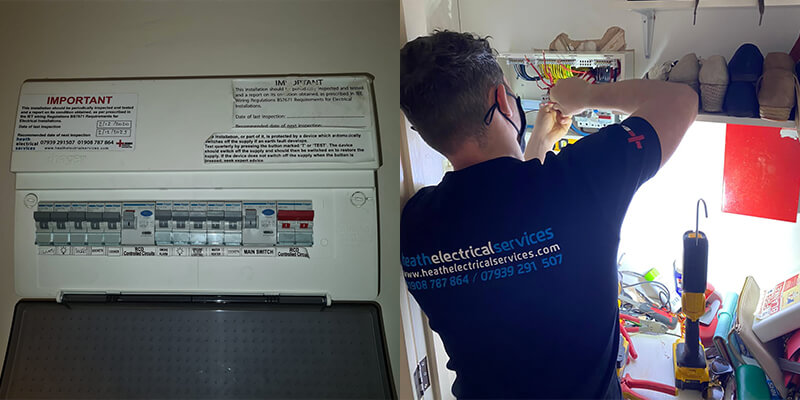
Replacing your fuse box made easy!
Your fuse box is the central hub of your electricity, so keeping the inner components in full working order is essential. By spending time understanding how to spot problems and act on them quickly, not only can you save time and money, but you also avoid potential dangers in your home.
The idea of replacing your fuse box needn’t be a daunting task as our certified electricians in Milton Keynes are always just a phone call away should you have any concerns or require advice. Having completed many fuse box replacements over the years, our fully qualified team are more than equipped with the knowledge and skills required to help make the process as easy and stress-free for you as possible. Please feel free to get in touch with us today to find out more.












